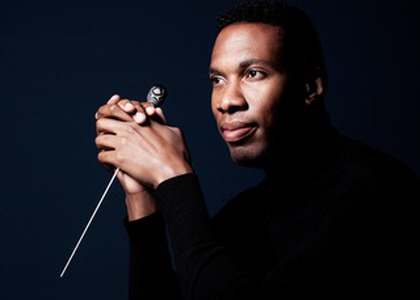> Interviews

Interview with conductor Roderick Cox
On Friday, November 15th, the American conductor Roderick Cox will conduct the Romanian Radio Chamber Orchestra during the seasonal concert.
You will be at the conductor's rostrum of the Romanian Radio Chamber Orchestra this Friday. The program contains Johannes Brahm's Tragic Overture, Felix Mendelssohn's Concerto No. 1 in G minor, Op. 25 for piano and orchestra, and Piotr Ilici Tchaikovsky's well-known Symphony No. 6 in B minor, Op. 74, also known as the Pathétique Symphony. A tragic note throughout the musical program can be noticed. How did you choose these pieces?
This nuance of tragedy and melancholy is indeed present, becoming a theme of this program. It is interesting how Tchaikovsky and Brahms met only twice, and they weren't really fond of each other's pieces. But I see a parallel here. On the one hand, I'm thinking about the contrast between the Tragic Overture and the Academic Festival Overture, another creation of Brahms that expresses a terrific luminosity - one laughs, the other cries. A similar opposition can be felt between Tchaikovsky's Symphony No. 6 and the hope, the triumph over fate in the endings of the previous Symphonies, No. 4 and No. 5. This last Symphony, No. 6,directly begins with a dark, melancholic atmosphere, with a profound internal conflict; there are suggestions of a strong anxiety. At the end of the piece, we are left with a feeling of defeat, fate had its saying. This is how we have built the program. Even Mendelssohn's Concerto has this tumultuous beginning - a stormy eruption. I think it's very well placed between these two masterpieces signed by Brahms and Tchaikovsky.
This is your first collaboration with the Romanian Radio Chamber Orchestra. How does this process look, how do you feel?
I'm delighted to be here and I feel a big curiosity regarding the approach of this program together with the Romanian Radio Chamber Orchestra. I feel like we're doing a great job, I appreciate the way in which the ensemble creates music, the dedication and the strong commitment of the musicians. I'm looking forward to the concert.
What do you think about your collaboration with the pianist Alexandra Silocea?
I know she is a fantastic pianist who's going to bring life and vigor into Mendelssohn's Concert, just like a great artist does. There's always enthusiasm, but there are also emotions when it's my first time working with a soloist. However, I do believe that the act of working together brings sense to our mission, to our work as musicians, so I am really looking forward to working with her.
Translated by Cristina-Andreea Dobre,
University of Bucharest, Faculty of Foreign Languages and Literatures, MTTLC, year II
Corrected by Silvia Petrescu














